- Home
- Christopher Moore
The Serpent of Venice Page 4
The Serpent of Venice Read online
Page 4
“I do not—” Antonio had taken off his floppy silk hat and was fanning himself with it, sweat having suddenly leapt out onto his brow.
“Beyond the monkey fucking, what heard you?”
“Nothing of a headless senator,” said the spice man.
“Pay him,” said Iago to Antonio.
“I don’t want to—”
“Twenty ducats?” Iago raised his scarred eyebrow to the merchant.
The spice seller shrugged, as if perhaps, in some land, a land where his children were not hungry and his wife was not so demanding, twenty ducats might possibly be enough to make him forget what he had never really heard, but here, in Venice, now, well, signor, a man has expenses, and—
“Or I can kill you now,” said Iago, dropping his hand to the hilt of his dagger.
“Never was there a more perfect price than twenty ducats,” said the spice man.
“Pay him.” Iago kept his hand on his knife and continued to regard the spice man as Antonio dug into his purse for the coins.
“And if word of what was said here passes your lips, your life is forfeit, as are the lives of your family.”
“How do I know you won’t kill me anyway?” said the spice man.
“Because Antonio has given you twenty ducats,” said Iago. “And Antonio is an honorable man.”
“I am,” said Antonio. He counted the coins into the spice man’s palm. “An honorable man with no interest in monkeys.”
Iago draped his arm around Antonio and led him to another corner of the square.
“He may require killing, anyway.”
“If you’re going to kill him anyway, I might have saved twenty ducats.”
“Twenty ducats is your fine for being shite as a conspirator. ’Twas foolish to meet on the Rialto.”
“How was I to know you were going to speak of murder? Why must I always be the one to pay?”
“Money is your charm, Antonio, one which we may well need in abundance to purchase the power we’ve lost with Brabantio. Another senator of the council of six.”
“If I commanded the wealth to purchase a senator, I wouldn’t need a war to pad my fortune. And none of the existing five council members favors our cause; they were all stung by the defeat to the Genoans. I fear our cause is lost.”
“Not if we can retain Brabantio’s seat.”
“Perhaps a year ago we might have put a candidate up for vote, spread our bribes around, but when the doge declared senate seats inheritable, our chances were lost. Brabantio’s seat would go to his eldest son, but since he has no son, it will go to the husband of his eldest— Oh my.” Antonio ducked out of the soldier’s embrace and backed away.
“It goes to the Moor,” said Iago. “Brabantio’s senate seat will go to Othello.”
Antonio looked around, hoping his friends might magically appear out of the crowd to rescue him from Iago’s wrath, which the soldier wore in a hardened scowl. “If you’d like, you can go kill the spice merchant, now. I’m not much for killing, but I’ll make a splendid witness.”
Iago held up a finger and Antonio fell silent. “If the first daughter’s husband will not do, we must make the second daughter the first.”
“Portia?”
“Aye, she knows us. She trusts us, she would do our will.”
“But she is not married, and Othello and Desdemona are even now on Corsica. Surely the doge will call them back.”
“Call his general from the field? We shall see. But word will be sent with a trusted lieutenant. Can you find a suitor to Portia to be our senator?”
“I know someone—the young man I mentioned, Bassanio, would be perfect—he has his eye on Portia already. He is handsome and controllable, and he owes me.”
“Good, arrange it. I will see to Desdemona and the Moor. I am off to the doge, then I’ll arrange the journey to Corsica.”
“But how do you know the doge will send you?”
“Did I not tell you, Antonio, that my own wife serves as one of Desdemona’s ladies?”
“No. You sent her there?”
“When the Moor chose Michael Cassio as his second in command over me, I had to keep friendly eyes upon them.”
“Well planned, Iago. What will you do in Corsica?”
“Do not ask, good merchant, if you wish to stay a clean and honorable man.”
“Oh, I do. I do.”
“Then I’m off to the senate, with the news,” said the soldier.
“Wait, Iago.”
“Yes.”
“If money is my charm, and you have none, and power was Brabantio’s offer, and you have none, what do you bring to this enterprise to justify a third of the profits?”
“Will,” said Iago.
“Well, get on with it, thou shit-breathed carbuncle! I don’t have all day.”
When you start shouting at things in the dark, you’ve essentially given up, haven’t you? You’re more or less saying, “Well, I know I’m fucked six ways to doom, and I’m frightened out of my wits, but I’d prefer we get this over with quickly and with as little pain as possible.”
But the thing in the water did not snap off my head, and my arms began to tremble until I could hold myself no longer. I let loose a great scream, relaxed my arms, and fell onto the slack of the chains like a plunging marionette, nearly wrenching my shoulders from their sockets and the skin from my wrists when the shackles went taut.
I continued to scream until my voice broke and what breath I had came with a desperate animal yowl that filled the chamber, the darkness, the very reaches of my imagination. All life became the instant before the bite, the slash, the sting from the thing unknown.
Nothing.
I hung slack in my chains and the water settled, a low wail drooled out of my lungs—hope hissing away. I would die now.
Water droplets tapped on the ledge by my hand and echoed like slow, distant clapping—Charon at his oar, applauding the pathetic efforts of his next fare to the underworld.
Something—a fin, perhaps—brushed my foot and I resumed my scream, kicked at the thing, which enveloped my legs, holding me fast, moving around and up my knees, thighs.
My bladder let go, and for the first time since I was a boy, I prayed. “God, save me, thou pompous great prick!” (Did I say I had not been on speaking terms with God for some time? Only polite to acknowledge our mutual resentments, innit?)
The creature, while bear-bonkingly strong, was not spiny, nor was its skin rough like the sharks I had seen at the Rialto fish market, but smooth—slick—it slipped around me as if I were being strangled by a great, slippery cord. I began to lose consciousness, some dreamy flowing of the mind from the terror—vestiges perhaps of the creature’s poison. Off I drifted, welcoming oblivion, as a set of barbs pierced my hips and the monster fastened itself upon my man-tackle.
* A natural was a jester who came to his profession by way of a physical or mental anomaly—a dwarf, a giant, Down syndrome, etc. Naturals were thought to have been touched by God.
FIVE
Ladies of the Lagoon
In the sumptuous Villa Belmont did Portia Brabantio abide, a fair-haired, newly orphaned lady with the ripening of twenty-two summers upon her bosom, a wit as sharp as a dagger, and a beauty that had been praised on all the islands of Venice, particularly by those signors hoping to gain access to her knickers. Waiting upon the lady was her maid Nerissa, a raven-haired beauty half again as clever as her mistress, and as good a friend as money could buy. The two had been together since they were little girls, and so loved and hated each other like sisters.
“By my troth, Nerissa, my little body is weary of this great world.” Over her hair Portia wore a net of gold punctuated with pearls, which she picked at as if they were opulent lice.
“Well, buying shoes can be taxing, especially when you have only one maid to carry your parcels.”
“Not from buying shoes,” said Portia, lifting her gown to check that she was wearing new shoes and that all the travel and
her father dying while she was gone had not been in vain. “I haven’t been sleeping well since we returned from Florence. I wake thinking I hear screaming deep in the bowels of the villa—the sound of someone suffering, but when I sit up in bed, I hear nothing.”
“Perhaps if you did something during the day, milady—lifted a finger, maybe two, in care of yourself—exhaustion would pleasantly overtake you and your slumber would be filled with sweetest dreams.”
“Dancing?” ventured Portia. “I do so prefer dancing to suffering, don’t you, Nerissa?”
“You speak as if one must choose one over another, but as any gentleman who has turned you around a ballroom can attest, dancing and suffering can be partners in step.”
“Oh, sweet Nerissa, I shall miss your loving snark when I am married and you are safely installed in a nunnery giving good service to priests and pirates, or in a brothel bearing the gentle jumps of rascals.”
“Would it were so, but I fear I shall ever be here at Belmont, blowing dust and clearing the cobwebs from milady’s nethers, your father’s puzzle having verily assured your spinsterhood.”
They tittered through gritted teeth, then Portia flung her needlepoint off the veranda as if it were a pie made from leprosy, then plopped down on a marble stool by the table, her legs askew, elbow to thigh, hand cradling a troubled chin.
“Oh balls.”
“Milady?”
“You’re right, of course,” said Portia. She scowled at three jewel chests that were laid out on the table. “I know you’re right. No man is going to pay the bride price and pass Father’s sodding test. Three thousand ducats? It’s absurd.”
“Your father set the price and the test to see you married better than Desdemona.”
“And yet she shall have Belmont, her Moor shall have Father’s seat on the senate council, and I shall have one of our shoddy estates on the mainland—and for my bed, some rich old prat who’s good at puzzles.”
Nerissa walked around the table, running her hand over each of three jewel chests: gold, silver, and lead. “Perhaps once your suitors have proved they have the bride price, you can pick the one you fancy and we will steer him to open the right chest.”
“That’s just the point, I don’t know which chest holds my picture, and therefore the right to my hand. Father’s wax seal is on each of the locks, we cannot test them. I might have to marry the first man with three thousand ducats who chooses a key, or I may hand the key to the man I favor, only to have him pick a chest that holds some false treasure. Father vexes me from the grave. How did he think that such a test would lead me to a better man than wed my sister when the game is so bloody random?”
“He thought to guide your choice himself, while seeming to show no favor. I heard him say that he thought Desdemona married the Moor as much to defy his will as for any love of the general. With the bride price, he could assure that your suitors would be gentlemen of means, then with the chests he could steer the one he favored to the right chest, without spurring a rebellious spirit in you.”
“A fine plan, I suppose, had he lived. I might have at least guided his choice.”
“It was all properly drawn up by lawyers.”
“Father and his lawyers. Who was it that said, ‘First, kill all the lawyers’?”
“I believe it was the little English fool so favored by the doge.”
“Oh, well, it’s true anyway.”
“Then he said, ‘And after the lawyers, a proper thinning of you poxy nobles.’ ”
“So annoying.”
“Yet comely, in his jittering way.”
“You know, Nerissa, that enormous codpiece he wears is stuffed with scrap silk.”
“That is not how he carries himself.”
“Bowlegged, you mean?” Portia giggled.
“No, like he fears nothing. The fool stands steady among merchants turned jelly-spined for fear a wrong word might affect their fortunes. Steady anyway, before he was struck down by grief. Oh, to be loved so much that a man might ruin himself for my loss. That, milady, is a lover.”
“He’s an insolent fool, Nerissa, and tiny, too; I forbid you to fancy him.”
“I don’t fancy him, but I admire his boldness. Well, I admired it. They say he left in the middle of the night, took his monkey and his giant simpleton, and sailed back to France on a merchantman. Is that the bell at the dock?”
Portia stood, composed herself, and looked over the railing at where her needlepoint might have sailed. She turned and looked surprised as the doorman entered.
“Madame, Signor Antonio Donnola, a merchant of Venice, with two associates, Signors Gratiano and Bassanio, to pay their respects to the lady.”
“Oh, I remember Signor Bassanio,” said Portia, a crinkle of a smile sparkling in her gray-blue eyes. “Fetch refreshment, and bring some flowers for this dreary table. And, Nerissa, fetch those three daggers in their leather harness we found among father’s things. Antonio will know which of Father’s friends left them.”
“Yes, madame.”
CHORUS: And so, chained in the dark, naked and bedeviled by a hellish creature unknown, after five changings of the tides, the fool went mad.
I am not mad!
CHORUS: Fear did twist the jester’s tiny mind—stretch it past the limits of sanity until it snapped—and shivering and pale, he went mad.
I am not mad!
CHORUS: Stark, raving mad. Bonkers. Drooling, frothing, barking mad.
I am not bloody mad, you berk!
CHORUS: You’re shouting at a disembodied voice in the dark.
Oh, fuckstockings. Good point. Well, a bit knackered, perhaps, but not bloody mad. Although who could blame me, really, if I had taken a stroll down Barking at the Moon Lane, what with the poisoning, the thirst and starvation, the wounds, the pervasive darkness, and the fearsome creature lurking in the water, waiting to rend me to bloody shreds, and so forth. Enough, really, to put even the most sturdy bloke off his regimen, and I, a wan and wispy crafter of japes, what chance did I have to cling to sanity’s silken tether?
I kept my mind busy during low tides, like now, by plotting intricate tortures and revenges upon my captor, between sobbing and moaning piteously over my lost Cordelia, my freedom, and my exile from light and warmth. Between bouts of soul-crushing despair, I busy myself slurping sips of water from my arm. A small triumph, the steady dripping from above that clapped on the ledge by my hand, like the tick of my life’s clock running down, has turned out to be my life blood. It is freshwater, you see, no doubt leaking from some cistern above, and if I am determined, and I position my chains just so, I can drink enough as it runs down the chains and my arm to quell the thirst. Sometimes I busy myself by singing a song, or shrieking until my voice breaks. But when the tide is high and the chamber fills with warm seawater, then she comes, and this dark hell is a different place.
I do not know how long I have been here. I counted the changing of the tides for a while, but with no way to mark them, I lost count. It seems a lifetime, but it could be only days. I try to imagine Brabantio and his family moving in the manse above me, and I think I can hear voices, or the ringing of a bell, but I can’t be sure. The sounds I hear in my head, the voices of the dead, are as real to me as anything I might hear from outside.
I talk to them, the dead, who come to me in the dark, and if I squint, I can see them, those phantoms of my past, blue-gray against the blackness. Lovers, friends, enemies, tossers, walleys, lick-spittles, catch-farts, slags, hags, and bum-snipers. People who I don’t remember ever having seen before pass by, pause, look at me, their eyes as black and empty as everything else. I don’t know if I dream them, or if I even sleep. The tide takes the weight off my chains and I drift. Just drift.
I always scream when she comes, sliding in by my knees, around the chamber, back behind my legs. Even if I have been waiting, anticipating, even if I am aware of her in the chamber, in that moment when she touches me, I am startled, terrified, and I can hear my pulse pound
like a battle drum in my neck. My chains rattle and I fall, crucified in my shackles before her.
She will not harm me, until she does, but I am given to that. That first time, when the Montressor’s poison and fear were still high in my blood, I felt it was a shark or a great eel in the room, saw in my mind’s eye the saw teeth tearing pieces from me. And when claws or spines fastened into my loins and something soft—ever so soft—like honey in water, wrapped upon my manhood, my mind could find no picture to put on the creature. What thing of the vasty deep was soft, gentle, yet strong, spiny? I had seen octopi alive in buckets of seawater in the fish market in Venice, and a fishmonger had dared me to touch one, and yes, it was soft, and disgusting, little more than a tripe with a purpose. “You fucking Venetians will eat anything the sea pukes up, won’t you? This looks like something shat out by something too disgusting to be allowed near a kitchen, and I am from a race of avowed offal eaters.” The fishmonger laughed.
This thing in the water, in the dark, was not an octopus, though. What did I know? But it worked away at me and after some time settled, curled around my feet, and stayed there. If it was to kill me, so be it. My legs were constrained, wrapped in coils of unrelenting strength up to my hips. I could not fight it, nor kick at it, and I had used all of my breath in shrieking at it. I fainted or surrendered, or was constricted until I choked, I don’t know, but when I was conscious again, the tide was out and I was alone in my chamber.
When thirst moved me to try to arrange my chains to channel water down my arm, my hand landed on something alive and I shrieked. (Yes, I do a lot of shrieking here in the dark. There is little else to do between the terror and the suffering—perhaps the disembodied tosser voice is right. Perhaps I have gone mad? Oh, well, how can you tell in the dark?) But it wasn’t alive, what was on the ledge—recently alive, perhaps. I ran my hand over it gently, feeling the spines, the fins, the eyes—a fish. Dead, but recently so—as long as my forearm and as big around. And the flesh had been scored, I could feel the cuts through the scales. I assumed the posture of prayer, where both of my hands could meet, and I ate the fish’s flesh, willing myself to slow down, not to swallow the scales or bones. It was the finest food I had ever eaten, and I felt my very being envelop it, making it part of me as if I were absorbing nourishment from the very dark itself.

 Lamb: The Gospel According to Biff, Christs Childhood Pal
Lamb: The Gospel According to Biff, Christs Childhood Pal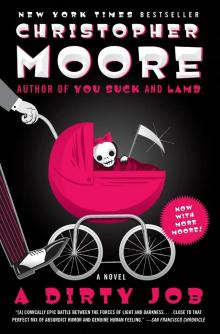 A Dirty Job
A Dirty Job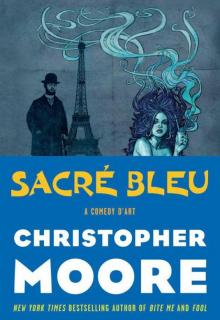 Sacré Bleu
Sacré Bleu Bite Me: A Love Story
Bite Me: A Love Story You Suck: A Love Story
You Suck: A Love Story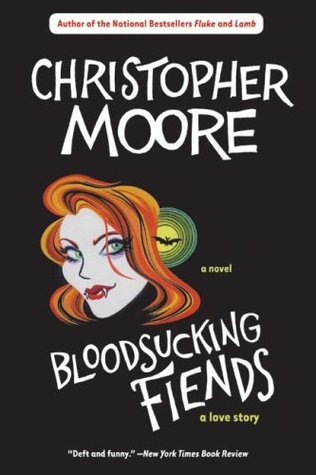 Bloodsucking Fiends: A Love Story
Bloodsucking Fiends: A Love Story The Stupidest Angel
The Stupidest Angel Coyote Blue
Coyote Blue The Lust Lizard of Melancholy Cove
The Lust Lizard of Melancholy Cove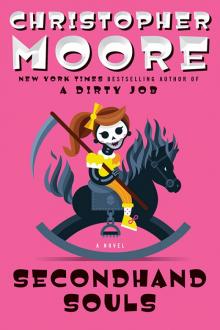 Secondhand Souls
Secondhand Souls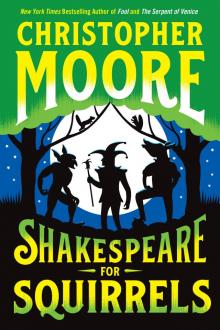 Shakespeare for Squirrels
Shakespeare for Squirrels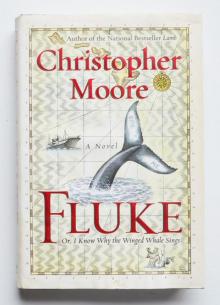 Fluke, or, I Know Why the Winged Whale Sings
Fluke, or, I Know Why the Winged Whale Sings Island of the Sequined Love Nun
Island of the Sequined Love Nun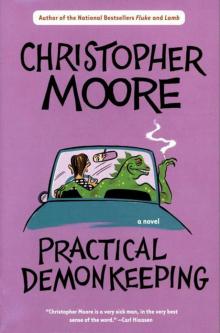 Practical Demonkeeping
Practical Demonkeeping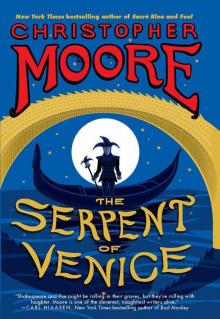 The Serpent of Venice
The Serpent of Venice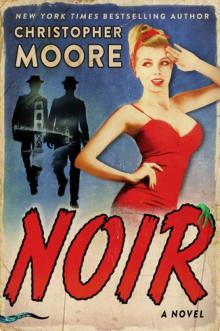 Noir
Noir Lamb: The Gospel According to Biff, Christ’s Childhood Pal
Lamb: The Gospel According to Biff, Christ’s Childhood Pal Bite Me
Bite Me Bloodsucking Fiends
Bloodsucking Fiends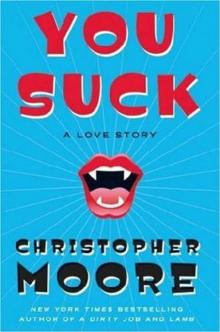 You Suck ls-2
You Suck ls-2 Bloodsucking Fiends ls-1
Bloodsucking Fiends ls-1 The Stupidest Angel: A Heartwarming Tale of Christmas Terror
The Stupidest Angel: A Heartwarming Tale of Christmas Terror The Lust Lizard of Melancholy Cove pc-2
The Lust Lizard of Melancholy Cove pc-2 You Suck
You Suck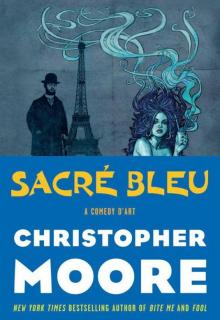 Sacre Bleu: A Comedy d'Art
Sacre Bleu: A Comedy d'Art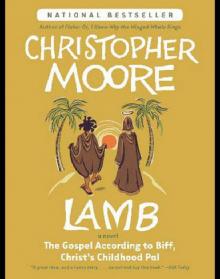 Lamb
Lamb 1867
1867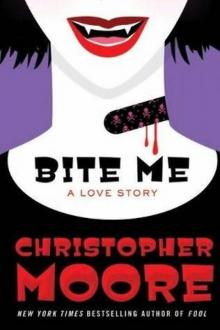 Bite Me ls-3
Bite Me ls-3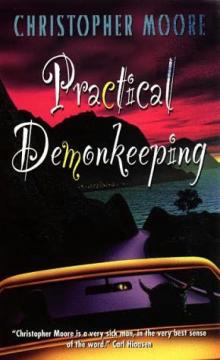 Practical Demonkeeping pc-1
Practical Demonkeeping pc-1